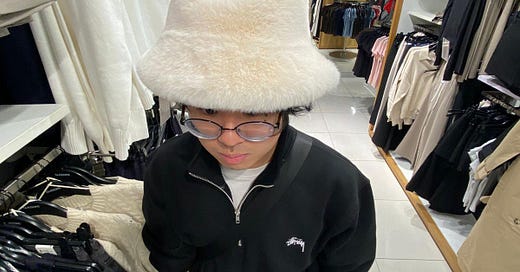Hola.
Sav here.
With how I’m scheduling all my cheeky entries on each Sunday of June, by the time this one hits your screen, I’ll be a glorious twenty-five years old.
The quarter life pickle runs rampant with burning questions on whether my life, career, relationships, personality, passions, etc. have been aligned with what I truly want for myself — whether we discover what we want for ourselves or create what we want for myself, which are two separate camps of thinking which could really make its way into a standalone post.
My feed on every form of social media is sure to be filled with conflicting content surround the mid-twenties, partly because it knows I’m in search for it but mostly because I’d literally type it, with content spanning:
Hustle culture content that exemplifies why building wealth in your 20s via a business or investment is so important to create financial independence and retire early;
Self-care content which reminds us that we can take life at our own pace and that we only need to be appreciative of ourselves;
A buy-now-pay-later course on how to sell online courses or dropship products from AliExpress to instantly create a life worth living today;
Why travel and experiences are so important and we must use the prime physical times of our lives going to wonderful places and discovering ourselves, no matter the impact it has on our financials;
Critically doomer mentality on how there is no future for this generation given our move to a dystopian-future where AI takes knowledge work, content is slurry, and everything is owned by huge megacorps.
Or finally, content that criticises all of the above and tells the reader to live on their own terms (while having the most incredible, curated, adventure-filled backing track which implies that the life you not only must have, but also internally want, is one that involves chasing sunsets, sky-diving and a passionate kiss under a firework sky)
I like this one in particular by joselyn.hana on Instagram and I do not mean that with sarcasm. I do like this kind of content and frankly I’ve only started seeing it this year.
Loosely speaking, I’m contributing to that too with this 25 by 25 series, with part one here and part two there and today with part numero tres.
Part of me thinks that today’s version must have the best content considering it’s the one that gets uploaded on my birthday (15 June) — but whatever, because to this day, I still haven’t picked out the twenty-five talking points I’d like to talk to.
Oh, but part of me does want to turn on the paid functionality though LOL! Please don’t pay for anything yet. I don’t know if I’ve set it up properly and don’t intend to put anything on it yet but the subscribe string below costs zero dollars with the small requirement of your email address where you get an email about twice a week, funneled into the Social tag:
1. Cleanser, Lotion, Sunscreen
Despite a long-running family history of diabetes, high cholesterol and gout inflammation, I grew up an exceedingly healthy baby. The concept of taking vitamins or going for a check-up when not sick was completely out of my wheelhouse and other than a sniffly nose or ulcer on my lip, my immune system is fairly resistant to anything internal and external.
Alas, I was probably around twenty years old when I started paying attention to my skincare.
It wasn’t an extreme episode per se, but it was enough to be a mild annoyance. The pandemic gave me the socially-acceptable opportunity to have long hair, something I’ve personally always wanted to try, and that was roughly when acne started growing across my forehead like a colony on Mars.
This was also around the time I came across fashion and lifestyle YouTuber Tim Dessaint. In particular, A Beginner’s Guide To Skin Care For Men.
I like to say that this is where it started. And with 1.5 million views to date, I’d wager to say that that video is where many Asian guys, during the dawn of global lockdowns, started paying attention to how they treated their skin.
With the simple, two-minute formula of cleanser into lotion into sunscreen in the morning and no sunscreen during nighttime — you can achieve some miraculous physical and mental results in just a short time.
Physical in that you’ve got clearer, whiter, smoother skin with a thin but necessary layer of protection against all things UV, acne and sunlight. Sunscreen too, for whatever reason, has anti-aging properties that your 50+ year old self would surely thank you for.
Mental in that you can walk outside with confidence, knowing you’re more well-groomed, put-together and thoughtful about how you treat yourself. You know how to take care of yourself. You’re glowing — it’s subtle, but it shows.
And when it comes to nighttime, the cold water against your skin acts as a reset and cleanse against the outside world.
Once in the morning. Once at night. Give it a few days and you’ll feel like a kinder, fresher you.
2. Look good, feel good
I was going to weave this point into the above, but once the words started cascading like a bowl of spilled cereal, I realised it needed to stand on its own.
As we came out of the pandemic, I was determined to retire my printed logo tees and ill-fitting jeans for something more modern and palatable.
And the same way I think Tim Dessaint influenced a generation of Asian dudes to take care of their skin better, I believe he was ground zero of the minimalist, unobtrusive, relaxed look that a lot of Asian guys opt for today.
Pull me off the street on a random weekend and you will find the templated errands fit:
Uniqlo U Airism Oversized Tee
Uniqlo Wide Pleated Pants
White sneakers
Crossbody bag
If cold, a jacket of some kind
For someone who grew up with almost exclusively discount athleisure products, hand-me-downs from uncles and aunties and an oversized backpack no matter where I went — this is an insurmountable upgrade. It isn’t much at all and honestly, blends me into the archetype of pretty much every Asian dude in Sydney, but it’s more than enough to make me happier with the man in the mirror.
(And discriminatorily judging towards certain fashion trends… like sports speakers on clean outfits and literally everything that Balenciaga spits out)
It’s gotten a little more so when I started seeing my partner who was pretty determined to not date what is recently called ‘cod biawak’, which loosely speaking refers to a guy who wears any t-shirt and shorts combo available with no sense of matching or coordination (especially in conjunction with a girl who dresses very well).
It had accidentally doubled down in the last three months as I moved from a corporate-but-very-unstrict to a corporate-and-more-traditional office setting where I was strictly called out for wearing the above templated outfit when visiting (in contrast to my previous company where the CEO complemented my hoodie).
And while I don’t concur, I can now appreciate the effect that luxury brands have on how you perceive yourself. It’s a highly unaffordable but effective-for-the-right-people cheat code to believing you’re aesthetically put together. To add to that, fragrances — which are almost exclusively from luxury brands, have that same uplifting effect to.
The learning here is that you don’t actually need a million bucks to dress and feel like a million bucks, especially so as a man because let’s be honest, we’ve got this fashion shit on easy mode. Wearing something intentional, cohesive, in-tune with the occasion and your personality is all you need to be so dazzlingly ahead.

3. Your 9-5 is one of your strongest assets…
Your job takes up a significant portion of your waking hours and a decidedly overwhelming amount of your mental bandwidth.
The 37.5 hours per week on the employment contract doesn’t account for any accidental/incidental overtime, the potentially crippling commute to get there and back, and the emotional toll of dealing with challenging people and the mental bearing that chews on your subconscious — and this is coming from someone who’s pretty well-adjusted!
It feels like a lot. And it is a lot. There’s no faulting it and it can be terribly frustrating — but at this budding stage of my life, being in a traditional career is one of the strongest assets I have.
Let’s get the obvious one first: It generates cash flow. Cash flow is great. It keeps a roof above my head and running water in my toilet. It lets me eat good food and takes me from one location to another, either by a big metal box that transports dozens of people in one go or a personal metal box that transports me and a few others. It lets me spoil my girlfriend and rarely myself and can be funneled into investment accounts, setting myself up for my future, family and funeral.
Let’s tackle the next one: It generates learning and progression. In my last entry, I talked about how there is so much value in earning something, of the struggle/satisfaction that comes with solving problems related to your career and specialty of choice. Work takes up the majority of your peak performing hours and you will naturally become better at whatever it is you’re in — alas, it’s on you to make sure that they’re well-applicable skills, soft or technical, that can trickle across your career or even be brought into your personal life through fresh new perspectives.
(See: In the TV series Suits, the main character tends to discover breakthroughs in his work cases through conversations had in his personal life, and vice versa)
By virtue of both cash flow and learning intertwined together, there is security. The security of getting a paycheck. The security of having a predictable pipeline. The security of not needing to deal with the ups and downs of owning a business which not everyone has the aptitude or even appetite towards.
Yes, the economy can take a disastrously downward turn. Yes, a change in regulation can render you redundant. Yes, the advent of technology can overnight, eradicate your entire field of expertise.
And yes, there is the need for some level of foresight and agency to futureproof yourself against all of the above.
But between you and me, I’d rather have a job now… WHILE working on said futureproofing.
You either learn or you earn. Preferably both, but never neither.
4. …and don’t forget your other assets
I’m not particularly impressed by smart people who have unparalleled expertise in their chosen field.
The people I find most interesting are those who are well-rounded, intentional, multifaceted, and accomplished in the numerous ways that matter to them — those who have a wide variety of assets instead of just one extraordinarily good one. To simplify:
Has a career of some kind that they broadly like and is passionate towards (e.g. corporate job, start-up, own a business)
Has interests they enjoy partaking in (e.g. fashion, anthropology, watching basketball)
Has hobbies they enjoy doing (e.g. writing, knitting, playing video games)
Has experiences under their belt and the intention to collect more (e.g. travels, conversations, funny stories, their relationships, random bits of trivia that they read somewhere and just can’t help but share)
The above framework was shaped by this article by that I really liked:
It really shouldn’t take much, but given how many physical hours and mental hours we spend at work and the abundance of over-engineered disassociation tools at our fingertips; it’s so easy to funnel everything into [1], take little initiative on [4], fill [2] with the endless scroll and leave [3] on the shelves of our childhood, gathering dust with other things we once held dear but no longer have time to do.
This is why I keep a positive, encouraging mindset around career and development. There is so much more to life than work — but I don’t subscribe to the mentality that work is work and has no significance other than facilitating your livelihood. It is a place where structured and consistent learning can continue (see: point 3)
This is why I’m enamoured by people who talk about their interests. Tell me about the technical specifications of that three-housand dollar camera. Tell me how Napoleon won the Battle of Austerlitz. Tell me about that peculiar tech stock you’re investing in while we prepare a meal we’ve never made. Interests, admittingly, is something I’ve yet to redevelop.
Needless to say, this is why I’m making such a fuss about writing; why I sacrifice just a bit of shuteye in order to make it happen, even though I’m still embarrassed to declare that it’s something I enjoy and can’t stand having someone look over my shoulder during the drafting phase. It’s not that I want to turn it into a career; it’s an activity that I believe grounds me.
And finally, experiences is ultimate number four that I know is important but haven’t put much weight towards yet. I don’t know what it is yet but between you and me, I don’t actually think it’s travel.
5. Take the fucking compliment
The same way there is a fine line between bravery and stupidity, there’s a fine line between being humble to being a pushover; between being a pushover to a nuisance; between a nuisance to an annoying little cunt who can’t take a fucking compliment.
A limiting belief that I once thought a virtue was to respond to all forms of praise with gentle, humble decline.
“You look good today!” — “No, it’s awful. I just put on whatever I had.”
“I love your work!” — “I just got lucky. I didn’t really do anything.”
“You’re so kind!” — “I don’t know. You’re nicer than me.”
Whenever you respond with negativity, that is a subtle telling that you don’t believe you’re worthy of the compliment, that you’re actually a talking piece of shit, and that the other person is actually incorrect to show appreciation towards you.
In many ways, it’s also an invitation that they need to regale you with even more praise before it’s accepted — how many humble points does that get you?
It is not arrogant to take a compliment. It is not a crime to do good work. It is living proof that you are doing something right in their eyes.
When someone extends a medal of thanks, respect their opinion and accept it with honour — and this isn’t to say you need to actively search external validation, just let it support the stories you tell yourself. It’s a token of endorsement, not enforcement.
Alternatively, this advice works the other way too: Be generous with your praise.
You are listened to. You are appreciated. Your words of kindness can be a spark of light in a gloomy night, turning someone’s bad day into a slightly better one.
A few words of thanks and encouragement, even some that aren’t too thought-out but especially so if grounded in specificity, can have a lasting impact unlike you’ll ever know — seeping into bones, inspiring the moves the make, resurfacing during the most unexpected times in their future.
And mate, if you really, truly, genuinely think that people are saying shit to you just to be nice:
You’re probably right,
And what do you say to people who are nice to you?
Two words. They start with a T and Y.
I have a feeling you know what they are.
substacks i’ve liked recently:
the strangest way i test if someone truly loves me by
The window for making money in the 'knowledge economy' is closing by
🪟What you do today can improve all your tomorrows by
💐









Really love this piece!! You touch on many very relatable sentiments, appreciate the shoutout and references to great content by other creators too :)
On a similar note to your title / point #5, I also find it really hard to say “you’re welcome” when I help someone out. Maybe it’s a Chinese politeness culture thing, but I reflexively can’t say anything besides “no problem” and feel horrible accepting gratitude the same way I feel it’s shameless (and often indeed frowned upon in Chinese culture) to accept compliments